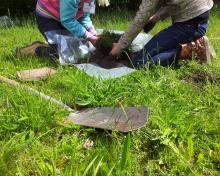Young citizen scientists investigate the soil
‘The Living Soil’ is a citizen science project taking place in the context of GLOBE, the Global Learning and Observations to Benefit the Environment programme: a worldwide community of 30,000 schools in 117 countries.
The participating schools work with scientists to explore the area around their own campus. The data generated by their local investigations is made available to scientists and students all over the world, for education as well as for research purposes. That means that pupils make very direct contributions to scientific research.
Connecting with society
RIVM is an official partner of GLOBE Netherlands. That partnership will continue to expand in the next few years.
RIVM has been taking part in ‘The Living Soil’ project since 1995. Liesbet Dirven, researcher at the Centre for Sustainability, Environment and Health, is the driving force behind this GLOBE project. She considers the citizen science project an excellent opportunity for RIVM to build stronger ties to society. “From a very young age, children are made aware of the soil and what an important role it plays in how food is produced. They take their own measurements, contribute to scientific research, and see their data displayed on maps.”
Mapping worms
Good soil quality is vital to agriculture, especially in the context of food production. Much of the data that the children collect ends up in the Dutch Atlas of Natural Capital. The worm counts are incorporated into the ‘worm map’ – but the data collected during the counts also measures soil respiration: the amount of CO2 that the soil ‘breathes out’.
Hands-on learning
So why is it interesting for the schools to participate? One pupil explains: “GLOBE lets us do lots of things out in the real world. In biology class, we just stick to theory and learning from books. Now we can actually do it all ourselves for once.” The teens really like seeing that their measurements make a difference – and they feel a sense of freedom at getting out of the classroom for a bit and spending time outdoors.
Collaborating with teachers
Each teacher taking part in the project is linked to a scientist. Liesbet Dirven has been matched with Frans Bezemer, a teacher at the Wartburg College secondary school in Rotterdam. Amongst other outcomes, their collaboration resulted in a joint publication. The Living Soil project is relevant to many of the subjects taught at school. It provides lesson materials for physics, geography and biology, for instance on such topics as sustainability.
GLOBE is a truly global network. The beauty of that fact is that it also facilitates international exchanges between schools, for instance with Ireland. “That makes the most of GLOBE’s purpose: putting your measurements on the global map.”
Submitting data
The real challenge, as Dirven explains it, lies in inputting the soil measurements. All the other modules in GLOBE already have apps that the young citizen scientists can use to enter data directly into the central database all by themselves – no hands-on intervention needed. “Students love taking measurements outdoors, but it’s a bit trickier to arrange to submit the data afterwards.”
To make it even easier to collate the collected data, RIVM will be connecting their project to the Nature Today’s website and its nature calendar, where it will be very easy to submit your data. An additional benefit is that other citizen scientists can supplement the data provided in that context.
RIVM in the classroom
GLOBE is also part of ‘RIVM in the Classroom’, an online platform where RIVM staff members provide guest lectures on a diverse range of topics. The lesson entitled ‘The Living Soil’ is one of these. RIVM can also provide lessons about such topics as drinking water or head lice.
Impact
Liesbet Dirven is pleased that this citizen science project has been such a success. “Through this experience, many children will have a first-hand encounter with the soil and learn how to investigate things on their own. They will be the eco-conscious soil users of the future! The Living Soil project and GLOBE in general have a clear scientific and societal impact. All the participants have a meaningful role in the bigger picture.”
